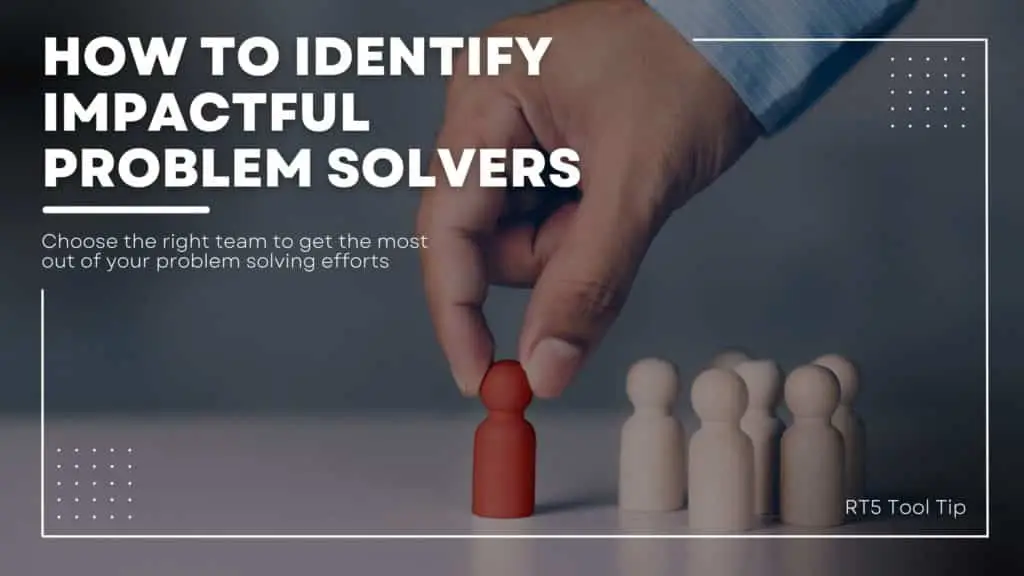By Dick Shainin
You’ve got great problem solvers; we’re sure of it.
You open your laptop to see a bright blue screen.
You try control, alt, delete. Nothing.
You turn your laptop off and back on. Nothing.
You uninstall your latest updates. Run a system restore. Scan for malware.
We’ve all been there, and we all go through familiar steps to attempt to fix the issue. But what if the steps don’t work?

At your company, we imagine you have a lot of problem solvers. They go through various steps, and hopefully resolve the issue. But what happens when it’s not? It’s times like these when you need people will think outside the box. People who can use specialized tools to find and mitigate the root cause quickly.
Just like any other ability, those with a natural talent for problem solving are the best candidates to further hone that skill. Giving them access to the right tools and opportunities leads to improvements on both sides. Imagine having a team that is literally unstoppable at solving ANY problem; and can do it fast! As a leader, you know that pairing quality direction with the appropriate professional can be challenging. But when you done right, everyone wins!
Traits of Great Problem Solvers
Over the years, we’ve learned there are a few tell-tale traits that can indicate whether someone will be an exceptional problem solver. Pinpoint those on your team who consistently exhibit these traits, as they’ll be your best bet for expanding your company’s problem-solving culture while achieving an optimal ROI.
These individuals will be:

- PROACTIVE | They aren’t comfortable leaving a band-aid solution in place long term and come to you frequently for proposed improvements for the systems they oversee. They may be a more tiring person to manage since they are never content with “good enough,” but this is exactly why they’re perfect for the job. These are the people who just need a few more tools in their toolbox to make them the most effective problem solver.
- IMPATIENT | Normally being impatient is seen as a weakness. But the truth is, when problems are serious, impactful, and complex, it’s vital that the people working on it aren’t okay with making incremental improvements. Great problem solvers are not satisfied with a test which will take weeks to execute. They want to generate clues quickly.
- CREATIVE | In problem solving, this means they’re comfortable thinking of new ways to tackle problems. Whether they work on the shop floor, engineering, or in the lab, these individuals don’t want to do things the same way every time. They look at the world through a different lens, which makes them the perfect person to understand Y to X thinking.
- PERSISTENT | These are the people who aren’t easily put off by challenges. Problem solving is hard. It’s frustrating and can be exhausting. The people who you choose for problem-solving development have to be the type of person who is excited to tackle the company’s most complex problems, especially because it means it’ll be a big task.
- INQUISITIVE | Since new skills take work to develop, they need to be excited about the process. You’ll notice the best candidates always look for new ways to improve their skill set or broaden their horizons; they ask questions and try to understand every aspect of not only their department but other departments too. They’re the ones who would be most excited when told about a new training that’s available.
- INNOVATIVE | Some of the best problem-solving methods are counter-intuitive and require re-examining the lens through which you view the world. It follows that the people who are most successful as problem solvers, are the people who are resourceful in leveraging all of the above characteristics to solve problems quickly and efficiently.
The next steps after identifying high potential in your organization.
Great, you identified the team members with the highest problem-solving potential. Now, put this in action.
Your first step will be, of course, to give them all the tools they need to succeed. This means enrolling them into training, giving them a chance to practice their skills, and focusing their career growth on problem solving. They need to know this is a priority, and be given the support and resources to back that up.
Next is setting them up with mentors. You can learn a lot in a classroom and with a coach, but unless you’re using new skills regularly, surrounded by those who can answer your questions, speak your language, and promote the use of your new skills, you’re going to have a tough time retaining your competence. By setting up your problem solvers in a team where they can lean on the experience of mentors, you’re ensuring they absorb a problem-solving culture that they can then take to the rest of the company.
Finally, put your problem solvers in positions where they can excel and expand their experience. Your team needs ample time to test out their new tools, make sure they know when to apply them, and how to utilize them most effectively. You’ve invested significant resources in amplifying their talent, so in order to get the best ROI, you’ll need to keep them working on relevant projects where they can put their new skills to use.
If you have additional questions about how to choose and nurture problem solvers on your team, reach out to us here.




